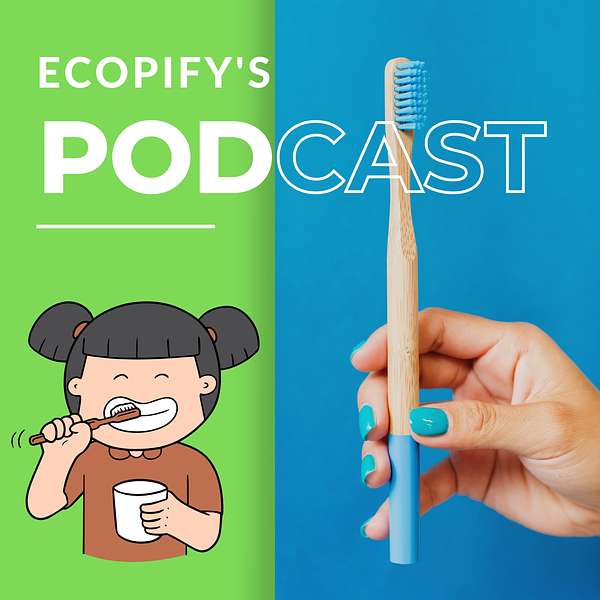
Ecopify's Podcast
Ecopify's Podcast
How To Properly Taking Care Your Toothbrush?
By maintaining your toothbrush, you're maximizing how much bacteria it can remove, and that is why in today's video, I will provide you with a comprehensive overview of the basics of proper toothbrushing, as well as tips on how to take care of your toothbrush correctly, so you can have the right tool to maintain a healthy smile.
- Buy Bamboo Toothbrush: https://ecopify.com/products/ecopify-bamboo-toothbrush
- Blog Post: https://ecopify.com/blogs/news/how-to-properly-taking-care-your-toothbrush
0:00 - Introduction
0:59 - How To Not Take Care Of Your Toothbrush
2:28 - How To Take Care Of Your Toothbrush
4:27 - Taking An Extra Step!
4:56 - Quick Takeaway
// LINKS //
Website: https://ecopify.com
Blog: https://ecopify.com/blogs/news
// SOCIAL //
Twitter: https://twitter.com/EcopifyOfficial
Instagram: https://www.instagram.com/ecopifyofficial/
Facebook: https://www.facebook.com/Ecopify
Pinterest: https://www.pinterest.com/ecopify
Youtube: https://www.youtube.com/@ecopify
TikTok: https://www.tiktok.com/@ecopify1
How To Properly Taking Care Your Toothbrush?
A key part of maintaining good oral health is taking proper care of our toothbrush. Your toothbrush is the tool that helps you remove harmful plaque that is stuck on your teeth. It's also your first line of defense against many gum diseases.
If you don't properly take care of the tools you use in your daily oral practice, your efforts to maintain a healthy smile will be much more difficult. Also, with proper care, your toothbrush will last much longer, so you won't have to replace them as often.
By maintaining your toothbrush, you're maximizing how much bacteria it can remove, and that is why in today's blog, I will provide you with a comprehensive overview of the basics of proper toothbrushing, as well as tips on how to take care of your toothbrush correctly, so you can have the right tool to maintain a healthy smile.
First, Let Me Show You How To Not Taking Care Of Your Toothbrush
Please do not try these following example:
1. Sharing your toothbrushes: You should never share your toothbrush with anyone, even your partner or spouse. Toothbrush sharing could spread germs and bacteria that cause tooth decay and other illness.
2. Brushing your teeth too hard: Applying excessive pressure to brush your teeth is a bad no-no. Too much force can cause damage to both your teeth and the bristles of your toothbrush, making them less effective at removing plaque from your teeth and gums.
3. Don't have a toothbrush container: The best way to keep bacteria from growing on your toothbrush is to store it upright in a toothbrush container.
Tip: Avoid storing your toothbrush near the toilet in the bathroom. Bacteria and germs become airborne during flushing and could end up on your toothbrush!
Summary: Sharing your toothbrushes is one of the worst ways to take care of your toothbrush. It increases the risk of getting sick or developing cavities. Brushing your teeth too hard is also not a way to take care of your toothbrush. Using excessive force can put extra strain on your teeth and your toothbrush bristles, which decreases their lifespan significantly over time. Another way to avoid taking care of your toothbrush is by not having a toothbrush container to store them between uses.
How to Taking care of your toothbrush
Many of us believe that toothbrush doesn't need any special cleaning wizardry. But, unfortunately, that is not the case. By just simply running it under tap water will not do the trick.
Fun Fact: If you take care of your toothbrush correctly, you can maintain your brush for up to 3-4 months before needing replacement.
Do these following example to help maintain your healthy teeth:
1. Rinse your toothbrush with water after brushing: Once you finish brushing your teeth, take some time to rinse your toothbrush off with water to remove any remaining toothpaste and bacteria still stuck on it.
2. Store your toothbrush upright so it can drain and air dry faster: After you're finished rinsing your toothbrush, you'll want to shake off any excess water left on your toothbrush. Then stand it upright to let it air dry.
Tip: Place your toothbrush in a Toothbrush Case after it is completely dry can prevent bacteria from building upon your toothbrush. (A toothbrush container is ideal for travel because it protects your toothbrush from dirt and dust inside your luggage.)
3. Replace your toothbrush every 2 months (or sooner if the bristles start to bend or fray): With daily use, your toothbrush will become significantly less effective at removing plaque due to the bristles on your toothbrush become frayed and bent over time.
Summary: Maintaining a clean storage environment for your toothbrush between each use is crucial for long-term oral health and a healthy smile. After brushing, you should rinse your toothbrush with water and leave them in an upright position to dry faster. Also, remember to replace your toothbrush every 2 months or sooner if the bristles start to bend or fray, so you can maximize how much bacteria your toothbrush can remove.
Taking An Extra Step
If you or your family members have been sick, such as with flu or cold, it is recommended that you throw the toothbrush out as soon as possible and use a new one instead.
Take an extra step if someone in your home is sick: The American Dental Association recommends you to throw away any toothbrush that comes into contact with the sick person to prevent the sickness from spreading.
Quick Takeaway
Knowing how to properly taking care of your toothbrush is important to keeping your teeth clean and healthy. By taking good care of your toothbrush, you increase its efficiency in removing bacteria and helping your toothbrush last much longer!
For most people, brushing their teeth daily is the best and first line of defense against tooth decay and many gum diseases, so having the right tooth prepared can truly maximize your result. Rinse your toothbrush with water after brushing, store your toothbrush upright, and replace your toothbrush every 2 months are some of the most common habits that people with healthy teeth do.